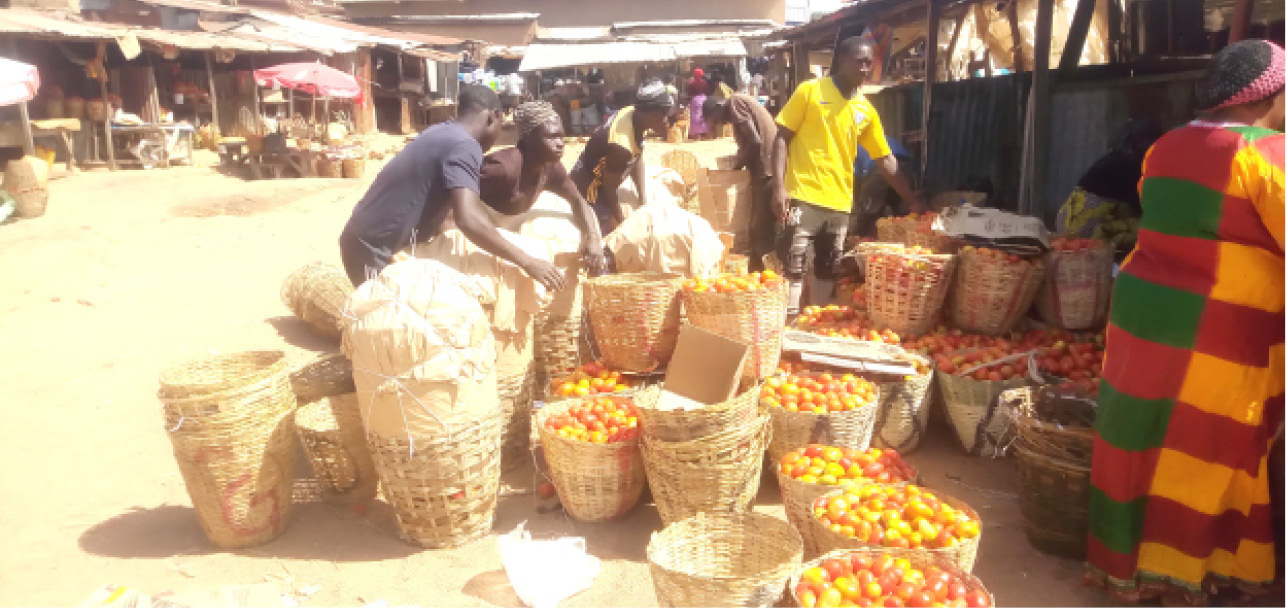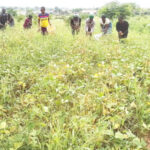As dry season farming for different crops commences in earnest in Plateau State, Tomato farmers and value chain stakeholders have expressed confidence in having a successful planting as well as a bountiful yield at harvest time.
Usually drying season farmers begin planting from September when the rains are in its last lap and the crop planted at that period will be nurtured into the dry season which often commence from October/November, and thereafter harvest between December and January (dry season).
Farmers in pain as flood ravages farms worth millions of naira
Flooding destroys rice farms in Taraba, farmers cry for help
For the tomato farmers in Plateau State, one would have expected that they would be pessimistic on this year’s dry season farming following the huge losses they made in the last (year) dry season farming to disease.
Some of the farmers then applied all the insecticides/pesticides they know but yet to no avail.
The effect of the disease then was that as the tomatoes begin to germinate and bear fruits, some parts of the leaves will begin to dry up, the tomatoes itself will begin to turn brown from the outside, while others will have black dots on the tomato.
Speaking with our correspondent, however, the farmers expressed renewed hope of a good dry season farming (planting, germination/yield and bountiful harvest) despite their last season’s harrowing experience and loss.
One of the farmers, Joshua Ngwen, said they are not unaware of last season challenge and the losses incurred, but will still look forward to a better season while making effort to apply the lessons learnt from the misfortune of last season.
Ngwen, who is the Secretary General of National Tomatoes Growers, Producers and Marketers Association of Nigeria, Plateau State Chapter, said the major tomato variety being planted for the dry season is the riogrande, while to some extent, others plant the UC82B which is also good and do well for dry season farming.
He said another variety which is not quite planted during the dry season farming is the sierra which is usually planted at the commencement of the rainy season April/May, adding that the sierra variety is not so round in shape, but usually looking long, like the shape of a garden egg.
He said the riogrande (which is robustly round in shape) has more market value at the dry season than both the UC82B and the sierra, followed by the UC82B which has market value during the dry season than the sierra.
According to him as the planting has commenced now, a hectare of land can produce 30 tons of tomato at harvest for the riogrande and slightly higher for the UC82B, all things being equal, but that the riogrande variety is usually bigger than the UC82B.
He said 100kg of tomato seedlings can cover one hectare (that’s for planting) and 1000kg of harvested tomato makes one ton. Therefore, he said, a 100kg tomato seedling which is bought for about N70,000 for riogrande) now will produce 30,000kg of tomatoes which eventually translate to 30 tons. And a ton is sold for about N100,000 thereby making the 30 tons on one hectare to generate about N3 million all things being equal.
Ngwen though said he is not cultivating a hectare, but a quarter of a hectare, and that he will be planting UC82B and not riogrande because riogrande takes longer time to harvest than UC82B, and he wants the one he can quickly harvest.
Another farmer, Prof Juliana Mafuil, who is also the association Treasurer expressed her optimism of a good farming and prosperous outcome as this dry season farming commences.
She however advised farmers to be more dedicated and ensure they spray their farms regularly with chemicals so that the experience of the last season disease attack can be checked.
She stressed that they are currently seeking for organic ways of fighting diseases and pests which is a more healthier way of combating it.
Similarly, the women leader of Tomatoes Market by Cele Bridge in Jos, the Plateau State capital, Ruth Izang, said with good and adequate spraying practice, the farmers can still overcome the incident of last season.

 Join Daily Trust WhatsApp Community For Quick Access To News and Happenings Around You.
Join Daily Trust WhatsApp Community For Quick Access To News and Happenings Around You.


